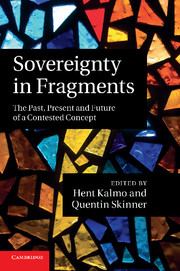Book contents
- Frontmatter
- Contents
- Notes on contributors
- Acknowledgements
- Introduction: a concept in fragments
- 1 The sovereign state: a genealogy
- 2 The apparition of sovereignty
- 3 The Westphalian myth and the idea of external sovereignty
- 4 Double binds: sovereignty and the just war tradition
- 5 The durability of organized hypocrisy
- 6 A matter of fact? The many faces of sovereignty
- 7 The survival of sovereignty
- 8 Sovereignty and after
- 9 Prolegomena to the post-sovereign Rechtsstaat
- 10 Sovereignty beyond the state
- 11 Sovereignty between government, exception and governance
- 12 Conclusion: vocabularies of sovereignty – powers of a paradox
- Bibliography
- Index
11 - Sovereignty between government, exception and governance
Published online by Cambridge University Press: 04 February 2011
- Frontmatter
- Contents
- Notes on contributors
- Acknowledgements
- Introduction: a concept in fragments
- 1 The sovereign state: a genealogy
- 2 The apparition of sovereignty
- 3 The Westphalian myth and the idea of external sovereignty
- 4 Double binds: sovereignty and the just war tradition
- 5 The durability of organized hypocrisy
- 6 A matter of fact? The many faces of sovereignty
- 7 The survival of sovereignty
- 8 Sovereignty and after
- 9 Prolegomena to the post-sovereign Rechtsstaat
- 10 Sovereignty beyond the state
- 11 Sovereignty between government, exception and governance
- 12 Conclusion: vocabularies of sovereignty – powers of a paradox
- Bibliography
- Index
Summary
Within post-modern thought, the concept of sovereignty (formed during late modernity) may be considered to be in crisis from at least three perspectives. First, from the perspective of the biopolitical transformation of the concept of sovereignty: as Foucault taught us, we must re-conceptualize the figure of government, shifting considerations of sovereign acts from a context of the production of laws or rules to a context of the production of norms or systems. It is understood that the intrusion of law in everyday life, from political-legal agencements on those of the common bios is not totalitarian, nor purely coercive, nor even – as Foucault tells us – simply disciplinary. It is a new dynamic of systems that intervene in the unique fabric of social reality and transform law from a disciplinary machine into an apparatus of control and governance. Second, sovereign power (or better, the tendency to exhaust the concept) can be analysed according to the schemes offered by Niklas Luhmann and his followers: they have insisted on analysing the fragmentation of law and the crisis of its normative image, and begun to analyse (and sometimes reconstruct) the functional processes of legal structures outside state normativity. Proceeding in these terms, these scholars were able to note how every autopoietic system (having criticized autopoieticism) was only illusorily connected to state normativity, while the latter became active in situations of social autonomy.
- Type
- Chapter
- Information
- Sovereignty in FragmentsThe Past, Present and Future of a Contested Concept, pp. 205 - 221Publisher: Cambridge University PressPrint publication year: 2010
- 5
- Cited by



